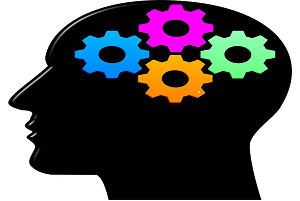Do you feel like you know what mindsets are? Do you see mindsets as being important to your success in life? Have you ever made any attempt to become conscious of your mindsets, or even further, change your mindsets?
For most people, the answer to these questions is “NO.”
To me, this is both expected and sad.
This is expected because few people that I know ever talk about mindsets in specific terms. This is sad because I have come to learn that mindsets are truly at the foundation of our lives and our success.
Thus, in this post, I want to try to demonstrate that to you.
First, consider a study performed by Carol Dweck and colleagues. In this experiment, they had students take a mindset assessment, and their scores were noted. Then, they had all of the students engage in an quiz where they were given 8 easy questions and then 4 really challenging questions (everyone essentially got 8 right and 4 wrong). The experimenters were interested in how the students would respond to failure. Thus, they had the students verbalize what they were thinking.
What they found was astounding
First, let me talk about those who scored low the mindset assessment. As they went through the 8 easy questions, they were thrilled and self-confident. But, as soon as they hit the 4 difficult questions, their morale came crashing down. They started talking negatively about themselves. They stopped applying themselves. Because they were failing, they internalized that failure and saw themselves as failures. And after the quiz, they were asked how many questions they got right and how many they got wrong. They recalled that they got 5 right and 6 wrong, thus under-emphasizing their successes and over-emphasizing their failures.
But, those that scored high on the mindset assessment responded completely differently. When they hit the 4 difficult questions, they responded by saying things like, “I was hoping this would be a challenge.” They saw the challenging questions as opportunities to learn. They continued to apply themselves. They saw this “challenge” as an opportunity to grow as opposed to any sign that they were failures. And, when asked, they were more accurate in stating the number they got right and the number that they got wrong.
What is so crazy about this is that these are essentially the same students, but the only thing that separates them is their mindsets.
This demonstrates that our mindsets shape how we:
- Think: One group saw the challenge as an opportunity, while the other group saw the challenge as something insurmountable
- Learn and Behave: One group kept applying themselves, while the other group gave up

But, the power of mindsets does not stop there. In addition to fueling our thinking, learning, and behavior, mindsets also shapes our physiology—how our bodies respond to the world.
In another study, researchers asked hotel attendants (those that clean hotel rooms) if they get exercise through their daily work. They all said, “no.” This was good for the researchers, because they then split the hotel attendants into two groups: one group was the control group (kept them the same), and the other group was given a 15-minute training instructing them that they got exercise through their daily work. Then, for the next month, they tracked the body weight, body fat, and blood pressure of all of the hotel attendants.
After a month, they found that the control group had the same weight, slightly higher body fat, and same blood pressure.
But, for those that now saw their work as exercise, they had lost weight (average of over 2 pounds), lower body fat, and lower blood pressure.
Summary: How the hotel attendants saw their work changed how their bodies responded to their work.
In all, mindsets are incredibly powerful. They drive our thinking, learning, behavior, and even our physiology.

These studies are just a couple examples articulating the power of mindsets and why we should aspire now to improve our mindsets so that we can improve our thinking, learning, behavior, and physiology.
To help you in doing so, I have developed a mindset self-assessment. It is a six-minute assessment that will provide you with an individualized and comprehensive report that will help you learn
- What mindsets are most important for success in life, work, and leadership
- The degree to which you possess these mindsets
- How you can improve your mindsets to become more successful in life, work, and leadership.
Take the assessment by clicking the button below:











One Response
I dont have any issues